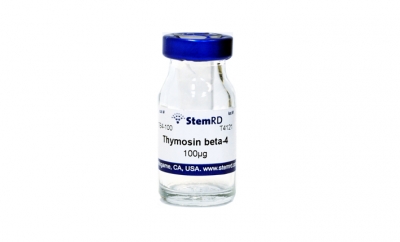| Source | M.W. | 4963.55 | CAS No. | ||
|---|---|---|---|---|---|
| Structural Info | Ac-Ser-Asp-Lys-Pro-Asp-Met-Ala-Glu-Ile-Glu-Lys-Phe-Asp-Lys-Ser-Lys-Leu-Lys-Lys-Thr-Glu-Thr-Gln-Glu-Lys-Asn-Pro-Leu-Pro-Ser-Lys-Glu-Thr-Ile-Glu-Gln-Glu-Lys-Gln-Ala-Gly-Glu-Ser-OH | ||||
| Formulation | Lyophilized in a solution of acetonitrile and TFA. | ||||
| Reconstitution | Before reconstitution, we recommend a brief spin to drive down any material dislodged from the bottom of the tube. The lyophilized peptide should be reconstituted in sterile PBS. | ||||
| Stability | The lyophilized protein is stable for at least 1 year if stored at -80 °C. Reconstituted protein is stable for at least 1 month at 4 °C, but should be stored in aliquots at -80 °C for longer term. Avoid repeated freeze and thaw. | ||||
| Purity | Greater than 95% as determined by RP-HPLC analysis | ||||
| Biological Activity | |||||
| Country of Origin | USA | ||||
Thymosins are small polypeptides originally isolated from the thymus, but most are actually present in many other tissues. The archetypical β-Thymosin is Thymosin-β4, which is a cellular constituent in many tissues. In addition to its role as a major actin-sequestering molecule, Thymosin-β4 has a role in tissue repair. Such effect have been shown in animal models of tissue damage and now in human clinical trials. Recently, Thymosin-β4 was shown to stimulate regeneration of adult cardiac progenitor cells in a paper published in Nature (Smart, et al., Nature, 2011, June 8th).
Amino Acid Sequence:
Ac-Ser-Asp-Lys-Pro-Asp-Met-Ala-Glu-Ile-Glu-Lys-Phe-Asp-Lys-Ser-Lys-Leu-Lys-Lys-Thr-Glu-Thr-Gln-Glu-Lys-Asn-Pro-Leu-Pro-Ser-Lys-Glu-Thr-Ile-Glu-Gln-Glu-Lys-Gln-Ala-Gly-Glu-Ser-OH
